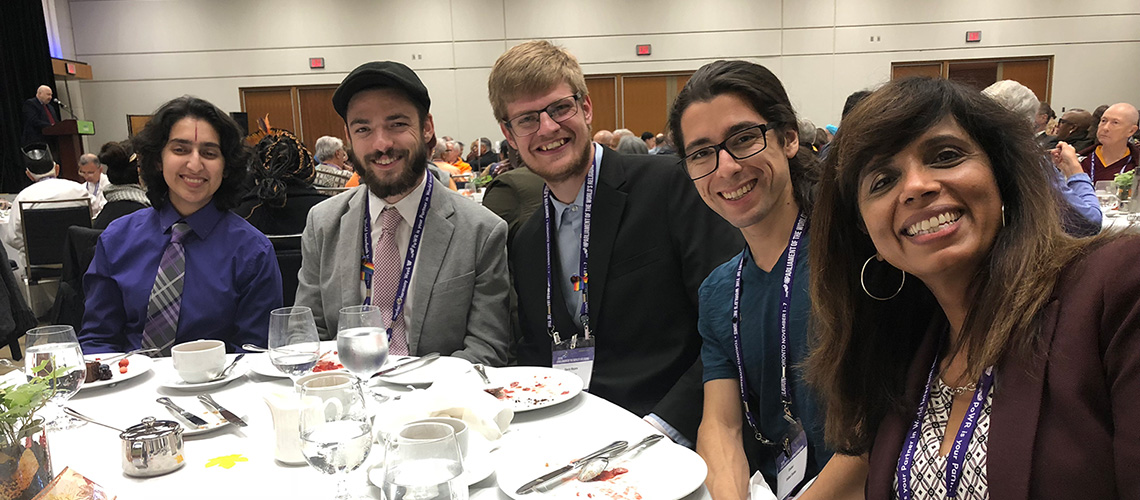M.K. Gandhi Center: Inner Peace and Sarvodaya
Academics
The Department of Philosophy, along with a dynamic program in philosophy and Pre-Law, houses the Peace & Conflict Studies Program, a Religious Studies option, the Jain/Hindu Dharma initiative, and also offers a Social Justice certificate. Below is a list of courses that relate to and explicitly make reference to Gandhi's life, work, and Gandhi scholarship [highlighted below].

Fall 2024
- PHIL 170T [extended course description of current iteration]: This seminar centers around the question of whether philosophical ideas and religious
virtues have the potential to transform our personal lives and effect social, economic,
and political change. More specifically, through studying writings from various philosophical
traditions and activist thinkers, we will examine how the principle of nonviolence—variously
known as truth-force, love-force, nonviolent direct action, and resistance—has historically
been used to bring positive change in personal, social, and political conditions.
Students will study Eastern and Western classical religious and philosophical texts,
Jain, Hindu, and Buddhist thought, Gandhian methods, and writings from various sources to critically evaluate the role of ethical principles
in building a culture of peace.
By analyzing academic and popular writings from a variety of disciplines and genres—philosophy, literature, speeches, autobiography, and dialogue—and audio-visual resources, the course will explore the following questions: how do we define peace and nonviolence? what is the connection between nonviolence and peace? Does the study of philosophy have the potential to transform the way we think and act? Furthermore, through select examples of philosophers, thinkers, and activists, we will explore how philosophical ideas and moral principles enable the cultivation of personal peace and, in turn, the capacity to address various challenges ranging from the personal, social, and ecological to the political. For the research project, we will focus on the works of thinkers and activists, especially understudied female leaders. In addition to critically analyzing ideas, each student will be given an opportunity to “experiment” with any philosophical idea(s) to test its efficacy in transforming oneself or effecting social change.
- PHIL 108/ASAM 108 [extended course description of the current iteration]: We begin, in Unit I, by getting a first sense of features of the Asian-American experience. In Unit II, we will be introduced to a variety of Asian religious traditions, the bulk of which concern religions that developed on the Indian subcontinent, notably Jainism, Buddhism, Hinduism [note: including Gandhi's interpretation of the Bhagavadgītā] and Sikhism. For each, we will introduce some basic tenets of the religio-philosophical tradition in question and discuss how they challenge various assumptions underlying western cultural narratives. In Unit III, we will reflect on the [at times radicalized] reception of these religious traditions in the U.S., drawing on incidents researched by students, and field distinctive challenges that members of these traditions face in the U.S. The overall aim is to become familiar with a variety of Asian-American conceptions of the self and the world, the associated ethical outlooks that inform Asian-American identities, to gain cultural competency, and to develop ways to challenge discriminatory tendencies. In Unit IV, we consider various strategies to productively mitigate them.
-
PAX 100 [extended course description of the current iteration]: We will approach Peace & Conflict Studies by focusing on how the notions of peace and nonviolence have shaped the thinking and acting of some of the most famous peace activists of the past two centuries. An emphasis will be placed on considering the activists that are memorialized in the university’s Peace Garden.
Accordingly, after exploring the question what, in striving for peace, we are trying to accomplish and whether promoting nonviolence might sometimes be immoral [Unit I], we will look at Jane Addams [Unit II], M. K. Gandhi [Unit III], Martin Luther King, Jr. [Unit IV], César Chávez [Unit V], Jiddu Krishnamurti [Unit VI] and Marshall Rosenberg & Iris Murdoch [Unit VII]. Throughout, we will investigate different ways in which
activists, philosophers, and activist-philosophers have conceptualized and implemented the struggle for peace and justice through nonviolent means.
Spring 2023
- HON 101 Emerging Voices. Religion, Society, and the Quest for Identity: Understanding through the Autobiographical Writings of Gandhi, Lewis, and Yousafzai. This course will examine the emergence of the category of "religion", a result of colonialism on the Indian subcontinent, and its social impact. Furthermore, this course will explore how the classification of religion led to a rise of nationalism, and new identities of caste, race, and gender in India and in other colonized contexts.
- PAX 100 Provides an overview of causes and types of conflict. Critical examination of issues related to war, peace, and justice. Principled negotiation; cultural awareness.
-
PAX 110 Theories, methods, and skills in personal transformation, anger management, communication, engaging cooperation, building community, reducing prejudice, maintaining relationships, and consensus decision making. Emphasizes multicultural perspectives.